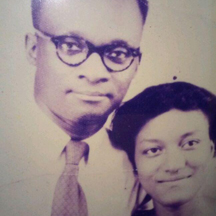In her 91 earthly years, Nemata Blyden ‘s mother, Amelia Elizabeth Kendrick Blyden, a descendent of enslaved Americans, has been a Negro, Colored, Afro-American, Black, and African-American. American society has labeled her as such all while being married to Sierra Leonean, Edward Wilmot Blyden III.
She gave birth to Nemata in the United States, but Nemata grew up in her father’s West African homeland. Nemata returned to the United States when she was 18-years-old to attend college.
Nemata, author of “African Americans and Africa: A New History,” told the gathering at the Alexandria Black History Museum that she saw the divisions between African-American and Continental African students at her university, but she also saw the similarities and differences. However, it was the stereotypes, she says, “that was a little bit of a shock.”
The relationship between Blacks raised in the US and those raised in Africa has historically had its “ebbs and flows,” she says, often depending upon what is happening socially and politically in the United States. The relationship has had less to do with Africa,” she affirmed.
She recalled how the naming of Black institutions reflected those ebbs and flows, such as the naming of the African Methodist Episcopal Church in 1816 and the National Association of Colored People in 1909, as many Blacks deflected from Africa and tried melting down into the American melting pot.
As in her book, Blyden called on the stories of many Africans, at home, abroad, and in-between, to weave an intriguing ride through this often not discussed story. She spoke of African-American historian George Washington Williams whose “The History of the Negro Race in America 1619–1880” is considered to be the first overall history of African Americans.
Blyden Explored African/African-American History
and Personal Relationships
and Personal Relationships

After a visit the Congo in 1890, his kinship with Continental Africans drove him to write an open letter to King Leopold II of Belgium about the suffering of the Congolese at the hands of the king's agents. He is buried in England.
POH subscriber Burnell Walker added, “Her views on African and African American relations, along with the disconnect, left me looking at our situation from a different angle.”
“Not only did I find her historical information interesting, such as the story about the African American missionary couple Mary and Joseph. But, her life story was equally fascinating,” remarked Port Of Harlem subscriber Burnell Walker about another life stories Nemata used to weave her research findings into a concise narrative.
Walker says he plans to research more about Mary and Joseph Groomer, who were United Brethren Church missionaries, who worked in Sierre Leone, circa 1871. “It will be somewhat ironic if those were their birth names,’’ he told Port Of Harlem during the book signing. Walker added, “Her views on African and African American relations, along with the disconnect, left me looking at our situation from a different angle.”
See Also:
Why Africans Became Coloreds, Anglo-Africans, Afro-Americans, Then Negroes
Book Review: What is Africa to You?
POH subscriber Burnell Walker added, “Her views on African and African American relations, along with the disconnect, left me looking at our situation from a different angle.”
“Not only did I find her historical information interesting, such as the story about the African American missionary couple Mary and Joseph. But, her life story was equally fascinating,” remarked Port Of Harlem subscriber Burnell Walker about another life stories Nemata used to weave her research findings into a concise narrative.
Walker says he plans to research more about Mary and Joseph Groomer, who were United Brethren Church missionaries, who worked in Sierre Leone, circa 1871. “It will be somewhat ironic if those were their birth names,’’ he told Port Of Harlem during the book signing. Walker added, “Her views on African and African American relations, along with the disconnect, left me looking at our situation from a different angle.”
See Also:
Why Africans Became Coloreds, Anglo-Africans, Afro-Americans, Then Negroes
Book Review: What is Africa to You?
Advertisers | Contact Us | Events | Links | Media Kit | Our Company | Payments Pier
Press Room | Print Cover Stories Archives | Electronic Issues and Talk Radio Archives | Writer's Guidelines






